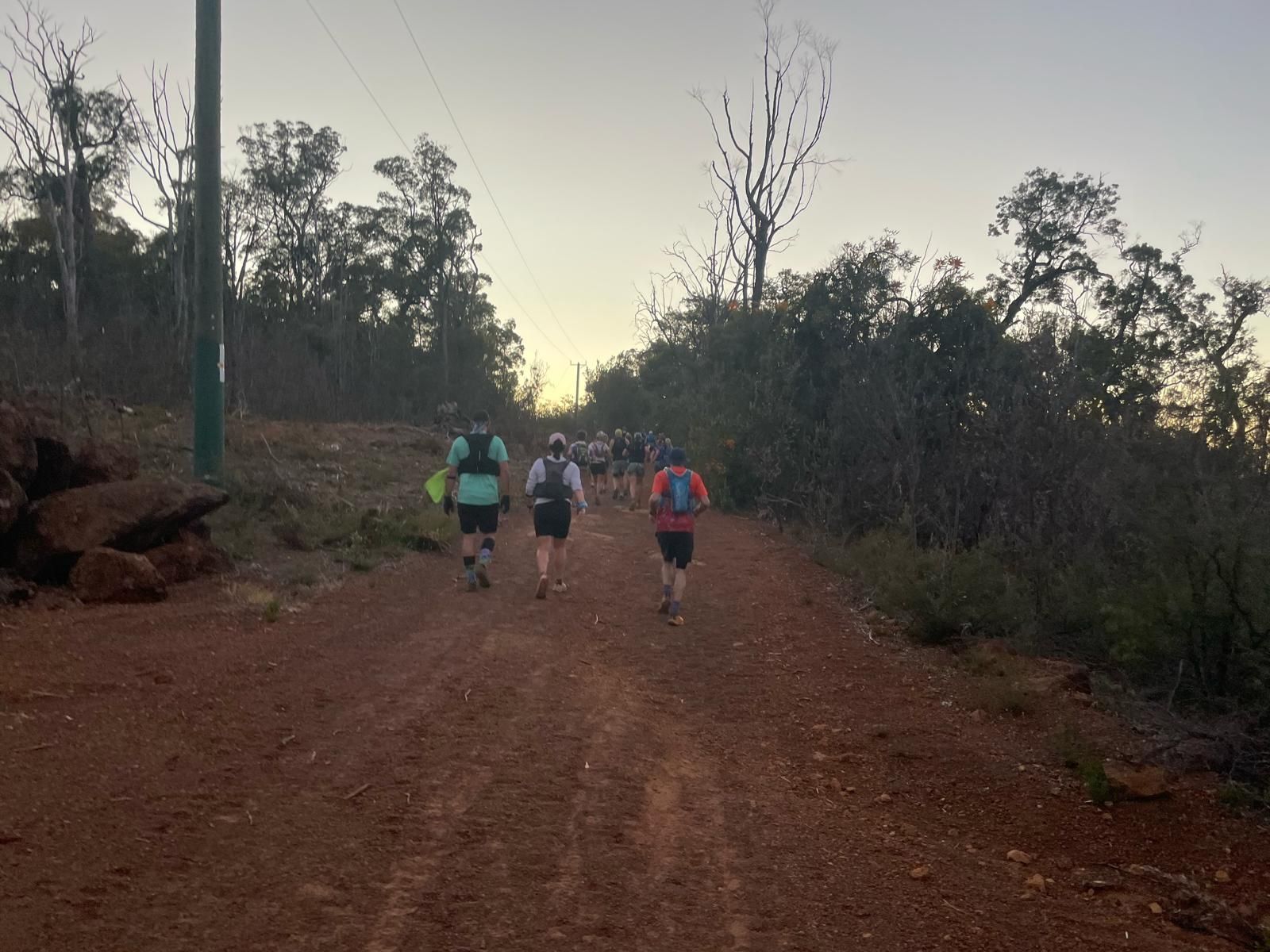
COACH'S CORNER - Unlock Your Mindset by Zac Harris
Zac Harris from overlap coaching provides his top tips on mental mastery on the run

Ever felt that burning design to stop what you’re doing when it gets tough? Whether you're out on a training run, riding the redline in a 5km race, tackling a marathon, or deep in an ultra, our mental strength plays a crucial role in overcoming obstacles. When the race becomes tough and discomfort sets in, it's easy to slow down or give up, but it's our mindset that helps us persevere and accomplish our goals. Sometimes, all we need is a slight distraction, just for a moment, to help us get back on track and finish what we started.
Here are some of my favourite tips and tricks when it comes to using (or tricking) our mind to get what we want when we're out on a run.
AUDIO DISTRACTIONS
- Music #1. Have a couple of different playlists handy. One playlist might be filled with songs you may not be in the mood for at the time, so have 1 or 2 others that are filled with different genres.
- Music #2. Ask your significant other (or best friend or crew) to create a playlist for you. The key is, though, don’t look at it until you're in the middle of your race and really need it. It’s a great surprise and depending on what they pick it might make you laugh, cry, fist pump, or mosh. Either way, it should distract you from the pain and discomfort for a while and get you through this tough patch.
- Podcasts. These are great for focusing your mind on something other than what is going on around you and within you, even if only for a moment.
BREAK IT DOWN.
This works best for longer distances but can still be used for shorter runs as well. The idea is to break the run down into more manageable bite-size chunks. For ultras, checkpoint by checkpoint works well. However, you can go as small as you need to at the time — kilometre by kilometre, tree by tree, step by step. When you get to that next point of reference, you might find you can keep going to the next one, or you can slow it down and walk for a moment, then pick your next reference point and go again.
COUNT
It seems simple, almost too simple. Pick a number and count it down to zero. When you get to zero, start again. Another one is to literally count your steps as you take them. Always give yourself a limit though, be it 25, 50, 100, or something completely random. When you reach it, start again.
REMEMBER YOUR WHY
Think about why you are here doing what you are doing, you must have a reason. Allow yourself to go deep within and discover what really pushed you to not only sign up for this event but commit to it and your training. What keeps you coming back? What motivates you? What do you love about it and what do you dislike about it? Think about your friends and family that have helped support you and encourage you. Even if you don’t find answers to these, it’s likely you have forgotten about the pain for a while.
MANTRAS
Have 1, or have 10, but these really do work. Again, they act as a distraction, even if only for a moment. The simpler and easier to remember, the better. Say them out loud, scream them if you want to, and repeat as often as necessary. Some of my favourites are as follows:
- “Left foot, right foot.” (repeat)
- “Just keep swimming, just keep swimming, just keep swimming, swimming, swimming.” (For best results channel Dory from Finding Nemo).
- “It’s just a day in the mountains”
- “How incredible is that view” (substitute view for anything you see that amazes you).
- “Run when you can, walk if you have to, crawl if you must. Just keep moving”
- “Pain is temporary”
- “The pain can only get to a 10, it can’t get any worse”
- “Get it done, and deal with the pain after”
- “This too shall pass”
- “Am I injured? No. Can I move? Yes. Then keep fucking moving.”
- "You can do hard things"
Tailoring Your Approach to Suit Your Personality
Consider using the third person perspective (YOU can do this) instead of the first person (I can do this) based on your personality type. Research has shown that some people are more likely to believe themselves when talking in the third person.
Side note: Clarifying the Concept of 'Pain'
Many of my personal mantras above refer to ‘pain’. It's important to be clear about what I mean when I use the word 'pain'. Another word I could use is 'discomfort'. Let me explain. Injury-related pain is typically a signal from the body indicating that something is wrong and needs attention. This type of pain can be sharp, acute, and localized, often resulting from physical damage like a sprain, fracture, or muscle tear. It serves as a protective mechanism, encouraging us to stop the activity causing harm to prevent further injury.
On the other hand, the discomfort or 'pain' experienced while pushing hard in a running race or in training is often referred to as exertional pain. This pain is generally characterized by a burning sensation in the muscles, breathlessness, and overall fatigue. It results from the intense physical effort and the body's natural response to the accumulation of lactic acid and depletion of energy reserves. Unlike injury-related pain, this type of discomfort is usually temporary and subsides with rest and recovery. It is a sign of the body's effort to adapt and improve performance, often leading to increased strength and endurance over time. Understanding and distinguishing between these types of pain is crucial for athletes to push their limits safely and effectively.
Run through discomfort, do NOT run through pain
Depending on the race, your specific goals and reasonings, and your motivations, you may deem it necessary and completely acceptable to run through injury-related pain. In this case, I suggest preparing a list before the race of the reasons or incidents which will determine whether you should keep going or withdraw from the race. Eg, rolled ankle, minor graze & bleeding, or dislocated finger? These might all be ok to continue running and what I refer to as the “non-negotiables” ie, you don’t need to think about it with these minor incidents, you just keep going. Whereas the more extreme broken bone or severe dehydration, for example, is better for you to withdraw and live to race another day. The point of this list is to take the thinking out of it during the race and allow yourself clear direction. When one of the non-negotiables occur, you shouldn’t have to think, you do what you need to do to manage it on the run and continue going. Whatever is on your list, it’s important that it is individual to you. And a reminder that we should always listen to and respect the event personnel. They might force a withdrawal upon you even if you feel you can keep going, and that’s ok. They have a duty of care to uphold and are just looking out for you.
Training the mind muscle
Training your mind is just as important as training all of the physical aspects of running, if not more.
You can do this in training by getting out the door when you would rather stay in bed, pushing through the last rep even though your body is fatiguing, holding pace for just 10 seconds longer before fading, going for your run in the rain instead of grabbing a beer and sitting on the couch.
In my opinion, the best way to create a strong mind is to put yourself in challenging situations and see what happens. Each time your desire to quit wins, analyse what happened and why, and try again. Next time when you get to this point you will know what you did and be able to say “No, this is exactly what happened last time and I’m not letting it happen again.” Each time you do this you will be able to push yourself further and further, and train your mind to be stronger and stronger.
Book suggestions for mental training
- Mindful Thoughts for Runners, by Tessa Wardley
- The Ultra Mindset, by Travis Macy
- Endure, by Alex Hutchinson
Top tip
Often, when we start to talk to ourselves negatively and spiral deeper into a hole, it’s simply because our blood-sugar levels are low. Grab some lollies, a gel, some coke, a redbull, literally whatever you’ve got with you and get it in. Persevere until the carbs hit and you should be on the right path again.
Thank you for reading. I'm interested in hearing some of your strategies for getting through a tough patch in a race and what gets you through the hard times and push to the finish. Leave your response in the comments.









